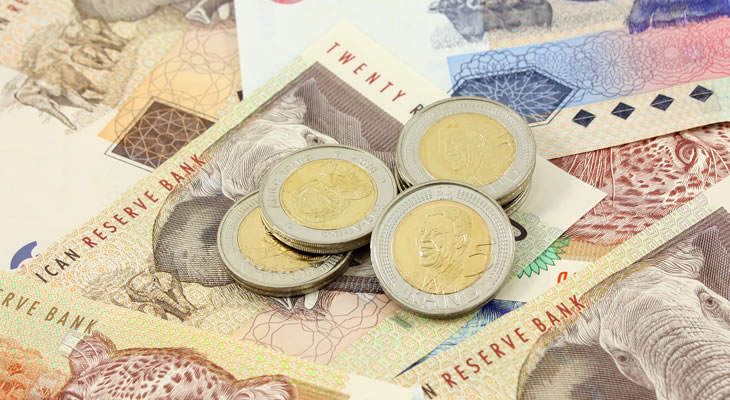- Pound to Rand Exchange Rate Below 18.70 – Edges Upward on Friday
- BoE Rate Cut Bets, Consumer Confidence Hurt Pound – Sterling plummets Thursday
- South African Unemployment Poor – But Rand gains on emerging market sentiment
- Forecast: BoE Meeting Next Week – Will the Bank of England cut rates?
The Pound to Rand exchange rate slumped on Thursday in response to warnings from a Bank of England (BoE) official that the bank might consider negative interest rates in the future in order to stave off Brexit-related damage. The Rand performed solidly due to an increase in emerging market currency sentiment.
GBP/ZAR struck a weekly high of 18.9531 on Tuesday as the Rand plunged on recently poor economic news. However with Pound sentiment falling further this week the pair landed on a yearly low of 18.5815. At the time of writing, GBP/ZAR trended in the region of 18.6500.
Pound (GBP) Undermined as BoE Rate Cut Bets Worsen
Sterling plunged during Thursday’s session, giving up most of its recent recovery attempts and hitting lows in against various major currencies. The Pound remained weak on Friday, but was able to recover slightly against a weaker Rand.
The primary reasons for the Pound’s downtrends have been poor economic data over the last week, indicating that the Brexit vote had caused genuine damage to Britain’s work sectors and economy as feared.
Thursday’s drop in sentiment came as investors adjusted their Bank of England (BoE) rate cut bets with under a week until the BoE’s key August ‘Super Thursday’.
Various high street banks such as NatWest have begun to warn customers that they may soon need to start charging for deposits, as concerns of the possibility of negative UK interest rates begin to rise. Reuters reports;
‘former BoE policymaker David Blanchflower was the latest voice to suggest the Bank may cut rates into negative territory in an article in the Guardian newspaper on Thursday. British banks have already begun to tell savers that they may start charging them for depositing cash.
… “Blanchflower’s comments nonetheless highlight that if we see very soft data over the next few months, then the market could start to price negative rates as a tail risk,” analysts from BNP Paribas said in a morning note.’
Sterling’s slump slowed on Friday as investors readjusted from Thursday’s fall, but BoE rate cut bets remained high and the Pound remained weak.
Rand (ZAR) Strengthens Despite Poor Data
The Rand was in a weak position earlier this week, as South African Reserve Bank (SARB) news from last week weighed heavily on the currency.
However, following this week’s central bank action in the US and in Japan, there was a slight surge in appeal for emerging market currencies, boosting the Rand’s recovery from its recent lows.
The Federal Reserve disappointed investors by leaving US rates frozen, even though this was expected and accompanied by hawkish tones.
The Bank of Japan (BoJ), on the other hand, introduced a smaller-than-expected stimulus package for the Japanese economy on Friday. While the Japanese Yen (JPY) strengthened on this news, it also increased the current risk-on movement slightly, bolstering emerging market currencies further.
As a result, the South African Rand was able to advance against the Pound despite recent labour data, which was far from favourable. According to IOL;
‘South Africa’s jobless rate inched lower in the second quarter to 26.6 percent on quarterly basis, but rose sharply year-on-year with over 400 000 more people unemployed.
High yield assets and commodities, considered a hedge against a low-return environment in developed markets, shone in the session. The rand also benefited from moderating inflation and still high lending interest rates locally.’
As some analysts had recently suggested that South African unemployment could worsen from its previous level of 26.7m this is a slight improvement. However, the rate remains higher than forecasts predicted.
Pound to Rand Exchange Rate Forecast: Bank of England Meeting Next Week
Just three short weeks since the Bank of England’s (BoE) July policy decision meeting in which it surprised markets by leaving the key UK interest rate frozen, the BoE is due to meet again in the coming week.
After the last week’s data, BoE rate cut bets have surged to the point where some analysts are even speculating the possibility of negative interest rates in Britain.
While it is unlikely for the BoE to cut rates by over 50 basis points in one meeting, markets have been surprised by the BoE in the past – just last month in fact.
Sterling will remain pressured in the coming week, but may experience some limited profit-taking rallies as Thursday the 4th’s meeting approaches.
The Rand’s brief surge on increased emerging market sentiment is also likely very temporary, and could easily see a late reaction to Thursday’s poor unemployment rate figures. Friday afternoon’s trade surplus could also undermine the Rand if it loses as much as ZAR10b as expected.
As a result, GBP/ZAR is likely to continue fluctuating in its current lows. At the time of writing, the Pound to Rand exchange rate trended in the region of 18.6500, while the Rand to Pound Exchange rate traded at around 0.05360.


Comments are closed.